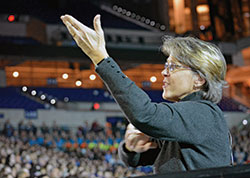National Catholic Youth Conference 2019
Special needs services send message, ‘all are welcome’

Joyce Ellinger uses American Sign Language to interpret for the hearing impaired during the National Catholic Youth Conference closing Mass at Lucas Oil Stadium in Indianapolis on Nov. 23. (Photo by Natalie Hoefer)
By Natalie Hoefer
Under the streets of Indianapolis, a youth on crutches rides a golf cart through a tunnel from the Indiana Convention Center to Lucas Oil Stadium for the closing Mass of the National Catholic Youth Conference (NCYC).
At that same Mass, a deaf youth laughs at a humorous comment made during the homily, thanks to a volunteer interpreting the words using American Sign Language (ASL). Later, several teens and adults with allergy issues receive Communion in special low-gluten hosts.
These scenes portray just a few of the ways in which the riches of NCYC are made available to all, including those with special needs.
“If you say all are welcome, people with special needs assume, ‘Oh, that means me, too.’ But that’s not always the case,” says local NCYC special needs coordinator Erin Jeffries, who serves as the archdiocesan coordinator of ministry to those with special needs.
That’s why, when signing up for NCYC, attendees can identify special needs they’ll require assistance with during the three-day event.
“It could be issues with hearing, vision, mobility, sensory issues, a need for low-gluten hosts—the needs vary from conference to conference,” says Jeffries.
For instance, 150 participants expressed a need for ASL interpreters at the 2015 conference. This year there were none.
But just in case, two ASL interpreters were present to sign in front of a section of Lucas Oil Stadium reserved for the hearing impaired during the conference’s four general sessions and closing Mass celebrated there.
Despite no registrants indicating a need, a young woman sat in the section at the opening session on Nov. 21.
“She was hard of hearing, but for some reason didn’t see the section for special needs when she registered,” Jeffries explained. One of the ASL interpreters volunteered to sign for the teen at the breakout sessions she wanted to attend the next day.
“We didn’t have any requests, but it’s a good thing we’re here—that’s why we’re here,” Jeffries said.
She noted that for this conference, “A big part of what I’m doing is accessibility issues. I connect people with local resources to rent wheelchairs and such, and there are some on site, too. We do what we can to help them get around.”
Jeffries arranged another just-in-case service, a quiet room for those with sensory issues.
“We put out paper, decks of playing cards, bean bags, a binder with steps on how to calm down—anything that might help someone who need time away from the noise,” she explained.
And for the first time this year, NCYC included ADA (American Disabilities Act) Needs informational kiosks. The Criterion stopped by one of the ADA booths on the second day of NCYC for a status checkup.
“We’ve rented out all our wheelchairs and scooters,” said Jeffries. “And last night the elevator [was damaged], so we were busy redirecting people this morning.”
While she serves as a local liaison, the National Federation for Catholic Youth Ministry which organizes the event offers special needs services as well, such as assisted listening devices, large-print and Braille program guides and gluten-free hosts.
The special needs services at NCYC are all about welcome, says Jeffries.
“Sometimes you need that explicit invitation, to say, ‘All are welcome, and here, we have these things available to meet your needs.’ ” †
See more coverage from NCYC 2019
